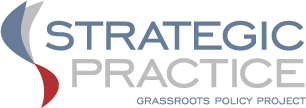Cell Blocks and Border Stops: Symposium Preview
On October 17, 200 organizers, scholars, theologians, ministers, cultural workers and community leaders will gather at the Union Theological Seminary for a symposium on the shared roots of two moral crises: mass incarceration and mass detention/deportations. The symposium is co-sponsored by the Center for Race, Religion and Economic Democracy, an institute at Union, and the Institute for Pragmatic Practice, at the Alliance for a Just Society. Here at the Grassroots Policy Project we are working closely with the Center at Union on the design of this conference.
To give you a flavor of the conference, here is a sampler of the discussions we'll have during plenaries and sessions:
- The structural and ideological forces that drive mass incarceration and mass deportation: the economic, political and cultural forces. Exploring how they come together at this particular moment in ways that expand the carceral sphere, militarize immigration control and increase police and surveillance in our communities.
- Neoliberalism and carceral control: The expansion of incarceration and militarization is joined at the hip with the expansion of market fundamentalism and corporate domination. Together, they reflect systems that marginalize, dehumanize and criminalize increasing numbers of people, while narrowing the circle of concern.
- Racialization: The role of criminalization of black, brown, immigrant communities, of dissidents, radicals, people labeled as deviant.
- The economics of mass incarceration: Expansion of carceral sphere has involved huge overall public investments. Those who have railed against social welfare spending have supported huge expenditures for police, prisons, courts and a variety of criminalizing measures, such as the very expensive war on drugs. It is not about reining in spending, it is about redirecting spending into the carceral sphere.
- Unpacking the dominant narratives that support and reinforce carceral and militarized state functions. This includes examining neoliberal commonsense and notions of penality in the neoliberal logic, as well as the uses of theological narratives to support criminalization and penality.
- Exploring alternative narratives that would support life-affirming systems that are designed to create thriving communities, support each individual in reaching her/his fullest human potential and expanding the circle of concern while democratizing all areas of social and economic life. Liberatory theological themes and narratives, drawn from a variety of faith traditions, are an essential part of developing and moving these narratives forward.
A couple of the sessions will get more into the critical role of liberatory theologies and diverse principles of faith both in resisting the expansion of carceral sphere and the criminalization of our communities and in creating alternative systems that support thriving, flourishing communities. We cannot topple neoliberal commonsense without drawing upon liberatory faith. It goes beyond the moral dimension; it speaks to the foundation of how we work and live together, value each other, express our values; economic and political structures should be based on these democratic and liberatory fundamentals. This has implications for our organizing.
You can sign up for the conference at the IPP site.

